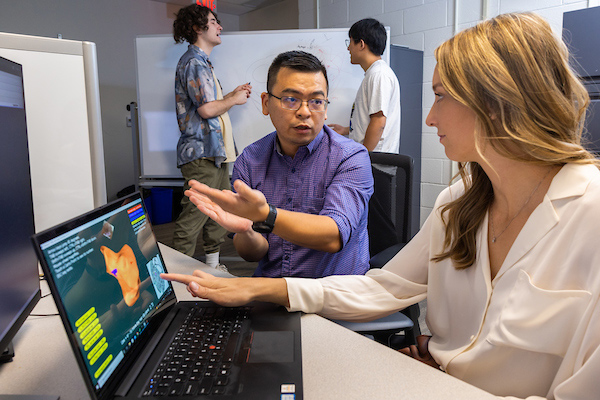Dr. Shijie Zhou’s recently published paper featured in the Canadian Journal of Cardiology
Shijie Zhou, an assistant professor at Miami University’s College of Engineering and Computing, recently had his paper researching ventricular tachycardia (VT) ablation featured in the Canadian Journal of Cardiology.

Dr. Shijie Zhou’s recently published paper featured in the Canadian Journal of Cardiology
Miami University College of Engineering and Computing (CEC) assistant professor Shijie Zhou recently had his publication on reducing the duration of transcatheter ventricular tachycardia (VT) ablation featured in an editorial by the Canadian Journal of Cardiology
Zhou’s research was commended by the journal for his promising method to more easily spot and potentially reduce the duration of a catheter’s VT ablation process. A VT ablation uses cold or heat energy to create tiny scars in the heart to block faulty signals that cause an erratic heartbeat. The association between VTs, sudden cardiac death, and structural heart disease have recently been emphasized by recent guidelines, potentially making this process quicker and safer.
The VT ablation process typically takes three to six hours, so finding a potentially quicker and more efficient way to spot pacing sites for clinicians to properly perform a VT ablation could significantly improve the process. This potential solution aims to reduce localization error as the number of pace-mapping sites in areas near the potential target site increase, which allows the process to be much smoother, quicker, and easier.
VT ablation is dependent on the accurate localization of its source, which is typically a time-consuming process, but Zhou’s development of a simpler method for cardiac electrophysiological imaging and mapping technologies will potentially make the process of ablation faster and safer for patients.
Zhou’s research in finding a quicker solution for pace-mapping from a small number of pacing sites will potentially help clinicians significantly reduce the duration of this process.
Zhou is an assistant professor in the CEC’s Chemical, Paper, and Biomedical Engineering Department and directs the Computational Clinical Cardiac Electrophysiology Laboratory (CCCEL).
Zhou’s research aims to combine machine learning, clinical cardiac electrophysiology data and computational modeling for clinical pre-planning and outcome prediction.